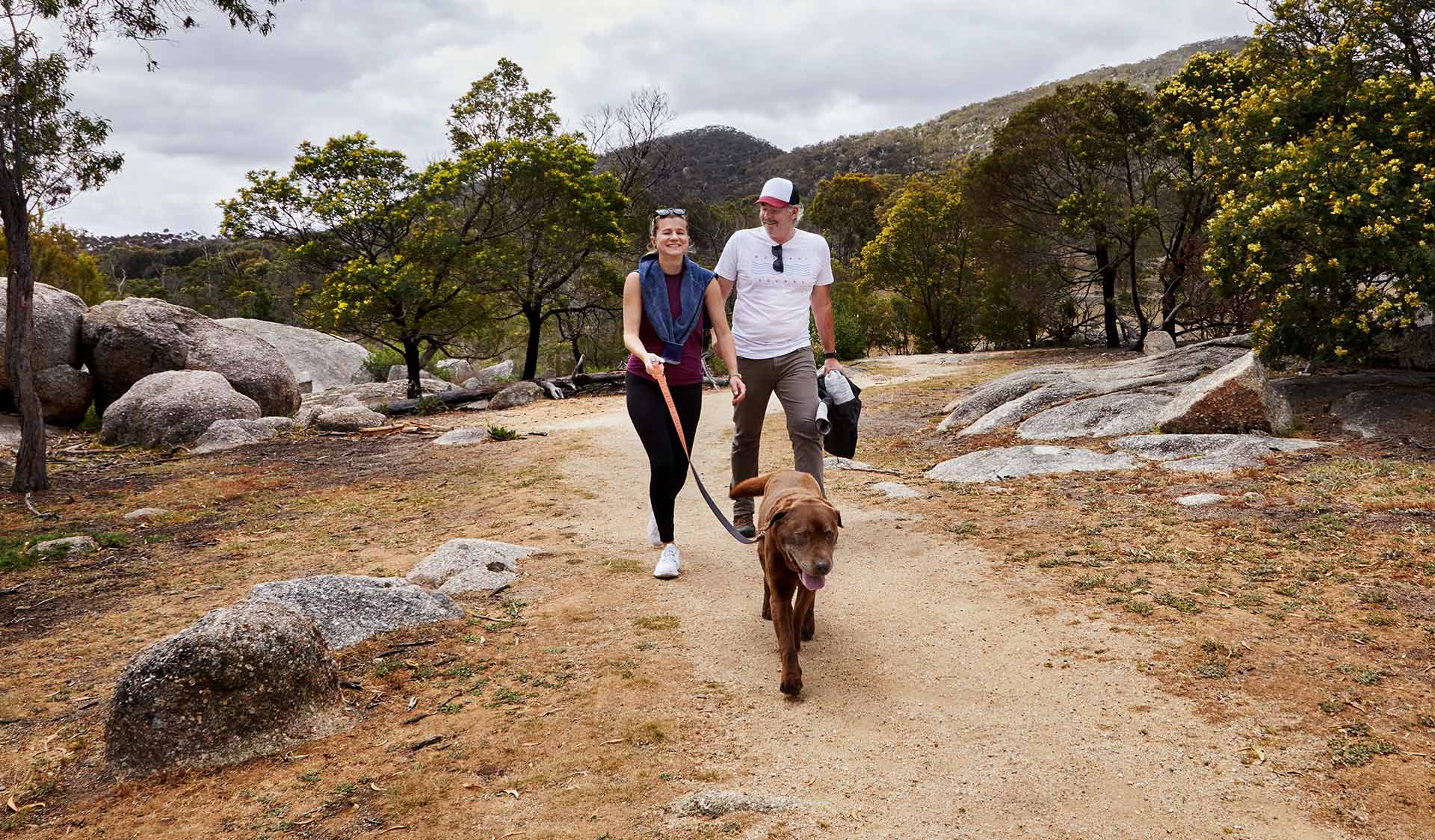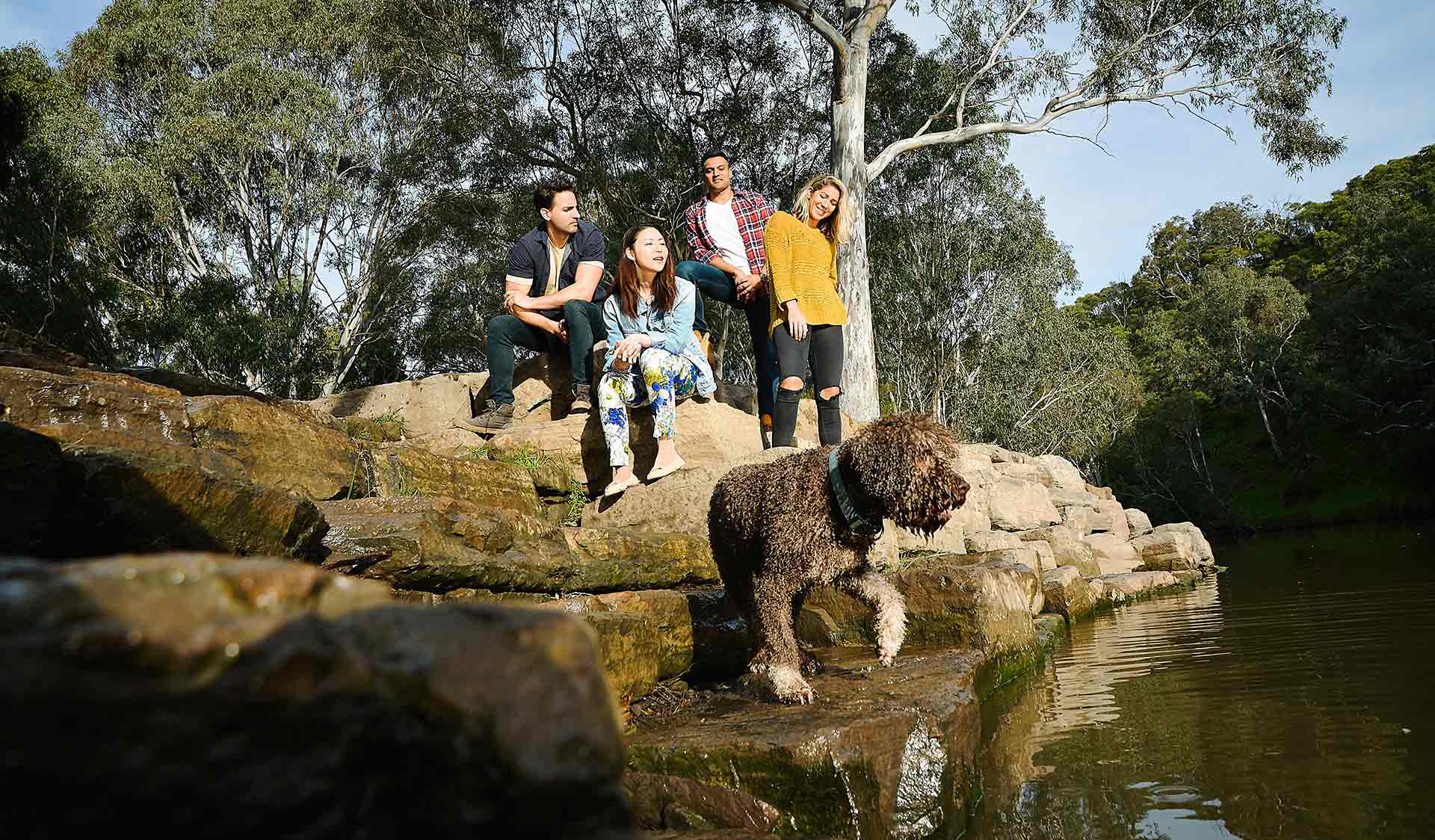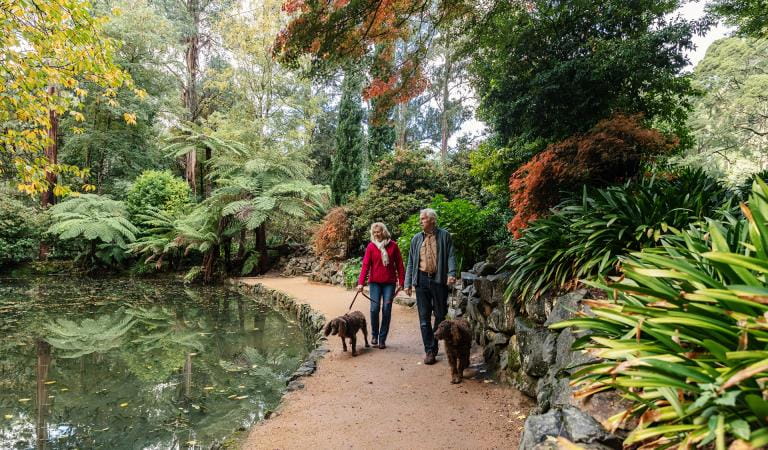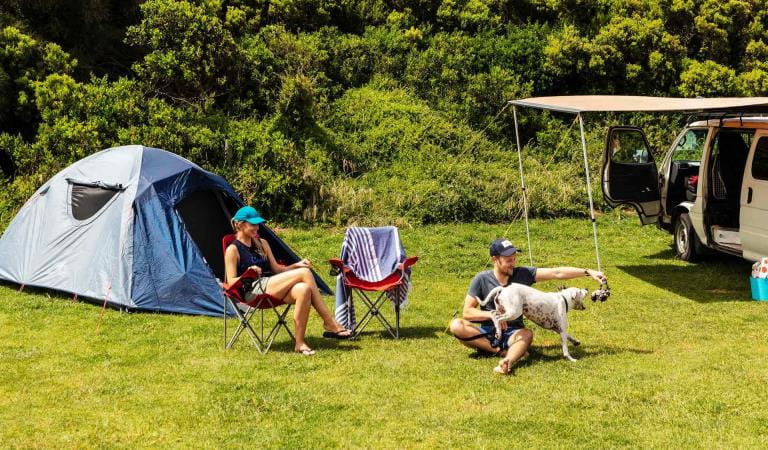Explore
Dog friendly parks
Nothing beats getting into nature with your four-legged friend but as a dog owner, it’s your responsibility to observe the rules around dogs in parks in Victoria and to keep them safe.
Dogs and other pets are generally not permitted in Victorian national parks but are welcome in many other parks and reserves, provided they are under control and on-lead.
Some parks allow dogs in some areas of the park but not the whole park. This is because dogs can be a real threat to our native animals.
Make sure you plan ahead and check information online and on park signage.
Assistance dogs are welcome in Parks Victoria parks and reserves. Entry requirements apply for parks and reserves that are usually dog prohibited, such as national parks. Find out more.
Where can I bring my dog?
Find the perfect spot to walk your dog across Victoria’s urban, regional, state and national parks.
-
Dog-friendly urban parksAlbert Park
Albert Park is a popular spot for dog walking. Take your dog on a walk around the lake or let them run in one of the two off-lead zones. More information: Dog Walking at Albert Park
Alfred Nicholas Memorial Gardens
Make your way down to the picturesque lake at Alfred Nicholas Memorial Gardens for a picnic by the quaint boathouse or simply enjoy walking your dog (on-lead) through the changing landscape of blooms and foliage.
Banksia Park
The open space, playgrounds and picnic areas of Banksia Park (Yarra Valley Parklands) make it a popular location for families of all ages. The dog-friendly park is perfect for cyclists, joggers and walkers. More information: Banksia Off-lead Dog Park (Yarra Valley Parklands)
Cardinia Reservoir Park
Dogs on a lead are permitted at Cardinia Reservoir Park. Please be mindful of the wildlife and don't take your dog along the reservoir walk or on the Kangaroo Viewing Trail.
Jells Park
Visitors can bring up to four dogs into Jells Park, and journey on-lead around much of this park. Dogs must be kept on a leash and always be under effective control. Dogs are not allowed within playgrounds and conservation areas. There are no dog off-lead areas at Jells Park, however, there is one located close by at Nortons Park.
Nortons Park
Nortons Park is the perfect place for an outdoor adventure with your furry four-legged companion, featuring an off-leash area and even a circuit including a ramp, sandpit and hurdles.
Pirianda Gardens
Dogs are welcome in Pirianda Gardens, but must be on a leash at all times.
Point Gellibrand Heritage Park
Immerse yourself in Victoria’s colonial past at Point Gellibrand Heritage Park. The Bay Trail is a great way for you and your dog to view the landscape.
Silvan Reservoir Park
Silvan Reservoir Park is an easy drive from Melbourne and ideal for a great day out. This dog-friendly park is perfect for a picnic or barbecue. Set up on one of the landscaped picnic areas or open lawns surrounded by eucalypt forest.
Yarra Bend Park
Yarra Bend Park is another great spot for some off-lead fun. Here, dogs can also have a refreshing swim at Deep Rock. Located close to Dights Falls, a rock embarkment allows dogs to easily access the Yarra River. -
Dog-friendly regional and state parksAgnes Falls Scenic Reserve
A happy pooch can take the lead through the rolling green hills of the Strzelecki Ranges at Agnes Falls Scenic Reserve. At 59m, Agnes Falls is the highest single span falls in Victoria.
Belfast Coastal Reserve
Exercising and exploring the wild beaches of Belfast Coastal Reserve with your dog is a fun and popular pastime enjoyed by locals and visitors alike. More information: Dog walking in Belfast Coastal Park
Brimbank Park
Dogs are permitted in many areas at Brimbank Park and must be kept on a leash at all times. Dogs are not allowed within the Kulin Wetlands and playgrounds.
Cape Conran Coastal Park
Explore a network of on-road and off-road tracks with canine friends in the rugged Cape Conran Coastal Park. The park features wild ocean beaches, estuaries, inlets, and heathlands. Camping with dogs is allowed in some areas.
Creswick Regional Park
Dogs are permitted in Creswick Regional Park but must be kept on a leash at all times.
Gippsland Lakes Coastal Park
Pack your four-legged friend for dog-friendly car-based camping at Paradise Beach in Gippsland Lakes Coastal Park, west of Loch Sport.
Hepburn Regional Park
Walk along the 1.8km Mt Franklin Summit Walk in Hepburn Regional Park with your dog. Mt Franklin, also known as Lalgambook by the Djadja Wurrung people, is a small volcanic crater that offers an ideal place for a picnic and a walk amongst plantings of huge conifers and deciduous trees. Walk to the summit of Lalgambook for great views of the area.
Howqua Hills Historic Area
Bring your dog on the Howqua Hills Heritage Walk in Howqua Hills Historic Area. This easy 4km walk follows the Howqua River from Sheepyard Flat to Frys Flat. Along the way, you’ll walk past the old brick chimney and smelting furnace built in 1884.
Kurth Kiln Regional Park
Dogs are welcome in Kurth Kiln Regional Park, but must be on a leash at all times. Bring your dog, on a leash, and set up at one of the many free bush camping sites located in the park.
Lerderderg State Park
O’Briens Crossing Picnic Area allows dogs on lead in Lerderderg State Park.
Macedon Regional Park
There are lots of great opportunities to walk your dog at Macedon Regional Park. Choose from a series of tracks that make up the Macedon Ranges Walking Track.
Marlo Coastal Reserve
Dogs (on-lead) are welcome in this perfect fishing and boating location at Corringle Foreshore Campground in Marlo Coastal Reserve.
Maroondah Reservoir Park
Keep your dog on a lead at all times in Maroondah Reservoir Park, and be mindful that dogs are not allowed north of the Watts River, including along the dam wall.
Patterson River
Dogs are permitted on lead at Patterson River. Patterson River is home to four two-lane boat ramps and a large car and trailer parking area. Meanwhile, the riverbanks are home to a flat 6km gravel circuit trail perfect for walking or jogging with friends or a dog on lead.
State Coal Mine
Dogs are welcome in outdoor areas and must be kept on a leash at all times at the State Coal Mine.
Toorourrong Reservoir Park
Dogs are allowed but must be on a leash in Toorourrong Reservoir Park.
Wattle Park
You are welcome to bring your dog to Wattle Park, but it must be kept on a lead during your visit and you need to collect and remove any dog poo.
Westgate Park
For the care and protection of the park, dogs are not allowed in Freshwater Lake, Ibis Island and Saltwater Lake in Westgate Park. Visitors are also not allowed to swim or fish in these areas.
Woowookarung Regional Park
Woowookarung Regional Park is perfect for bushwalking and taking your dog for a walk to scenic lookouts.
Yan Yean Reservoir Park
Lots of walking tracks, picnic areas and views of Melbourne's oldest reservoir, Yan Yean Reservoir Park.
You Yangs Regional Park
Dogs are welcome on-lead at You Yangs Regional Park. Please pick up all waste and take it away with you. -
Dog-friendly state forestsAll state forests, except Murrindindi Scenic Reserve and Stevensons Falls Reserves, are open to dogs. During your visit always keep your dog on a lead and under your control. Check with your local council for restrictions in municipal parks, reserves and beaches.
-
Dog-friendly national parks
There are a few exceptions. Only in these specific areas of the 6 national parks below are dog friendly.
Greater Bendigo National ParkDogs are allowed on-lead on specified roads and trails in the One Tree Hill section of Greater Bendigo National Park. Dogs walking off these roads and trails is not permitted. Nearby Bendigo Regional Park and State Forests permit dog walking. For more information, view the Dog walking in parks and forests around Bendigo map (PDF).
Great Otway National ParkThere are many areas within the Great Otway National Park that cater for dogs on-lead.
- Near Lorne: St George River Track
- Closer to Forrest: Lake Elizabeth Visitor and Camping Areas and walking tracks.
- Closer to Torquay: Ironbark Basin Picnic Area, Southside Beach, Addiscott Beach, Point Addis to Anglesea via beach and Surf Coast Walk, Ironbark Gorge Walking Track, Ocean View Walking Track.
- Johanna Beach: all areas.
The nearby Otway Forest Park permits dogs on-lead in all areas.
Heathcote-Graytown National ParkDogs are allowed on-lead in the McIvor Range area of the park.
Kinglake National ParkDogs are allowed on-lead in the Frank Thomson Reserve within Kinglake National Park.
Lake Eildon National ParkDogs are allowed in the Jerusalem Creek Campground in Lake Eildon National Park.
Yarra Ranges National ParkOn-lead dog walking is permitted on the O'Shannassy Aquaduct trail between the Dee Road carpark and Yuonga Road, Warburton in Yarra Ranges National Park.
Dog friendly parks
Dogs in national parks
If you’re planning on visiting a national park, you’ll need to leave your four-legged friend at home. Dogs are not allowed in most national parks in Victoria. This includes any beaches that form part of the national park."We love dogs, just not in the national park. The protection of biodiversity is critical for the health of these fragile coastal ecosystems. Dogs don't know the difference between a tennis ball and a small bird, and we can't blame them - it's instinct! They also don't know their excitable behaviour can result in the trampling of a threatened shorebird nest.” - Ranger Lisa, Mornington Peninsula National Park.
Driving through a national park on a public road with pets in the vehicle is permitted, provided pets remain in the vehicle while crossing the park. Remember, not to leave your dog alone in a vehicle as pets can overheat even when the window is down, or the car is in the shade. Visit the RSPCA to learn more.
We know most visitors want to do the right thing when they’re in nature, but there are penalties for bringing a dog into protected areas. If your dog is found in a protected area where they’re not allowed, or in a dog-friendly park but off-leash, you could be fined.
Assistance dogs
Assistance dogs are welcome in Victoria’s parks and reserves. Entry requirements apply for parks and reserves that are usually dog prohibited, such as national parks. Find out more about assistance dogs in parks here.Explore Victoria with your dog
Your A-Z guide to Victoria's dog-friendly walking trails
Dog friendly camping
Why aren't dogs allowed in national parks?
While dogs and other pets may be a valued part of a family, they’re a real threat to our native animals. Leaving the family dog at home can be difficult when you would like to visit national parks, but there are some good reasons why dogs are prohibited.
To protect wildlife
- The purpose of national parks is to provide a much-needed refuge for native plants and animals.
- Dogs are a predator and can scare, injure or kill wildlife. Prey species, such as birds and mammals, react accordingly, regardless of whether the dog is controlled or on a leash, or running free.
- Dogs leave scent in the bush that can keep wildlife away from an area even after the dog has left. The scent of a dog can have an impact on wildlife.
- There are penalties for bringing a dog to the reserve and if a dog is found to impact wildlife. The owner could face court action or substantial fines.
To protect other park visitors
- People visit parks expecting to enjoy the area without dogs.
- Many park visitors wish to see wildlife and dogs may compromise people’s ability to do this.
Keep your dog on-lead in permitted parks
Dogs are permitted in many parks and reserves provided they are always under control and on leads. Visitors should keep their dog on-lead, except in designated off-lead areas. Keeping your dog on a lead ensures you both have a safe park visit.
- Poison baits may be laid to control foxes or other feral animals. Baits can be fatal to dogs.
- Even if your dog is friendly, other dogs may not be.
- Your dog can catch parasites (such as fleas and ticks) from wildlife.
- Snake bites are a real risk in natural areas such as parks.
- Wildlife such as kangaroos and koalas will defend themselves if threatened by a dog and can cause significant injury to or the death of your dog.
Dog-friendly code of conduct
- Consider other park users and ensure that dogs are always kept under effective control.
- Always carry a lead, even when in off-lead areas.
- Bring a friend if you wish to walk with more than two dogs.
- Ensure children are supervised whilst near dogs, as they are vulnerable to attack.
- Ensure your dog’s identification, registration and vaccinations are up to date.
- Minimise any disturbance to native fauna, including birdlife in the park.
- Clean up after your dog and take all the rubbish home.
- Bring plenty of water for both you and your dog. Some parks do not have water available.

Big Rock Walking Track, You Yangs Regional Park

Deep Rock, located close to Dights Falls in Yarra Bend Park




